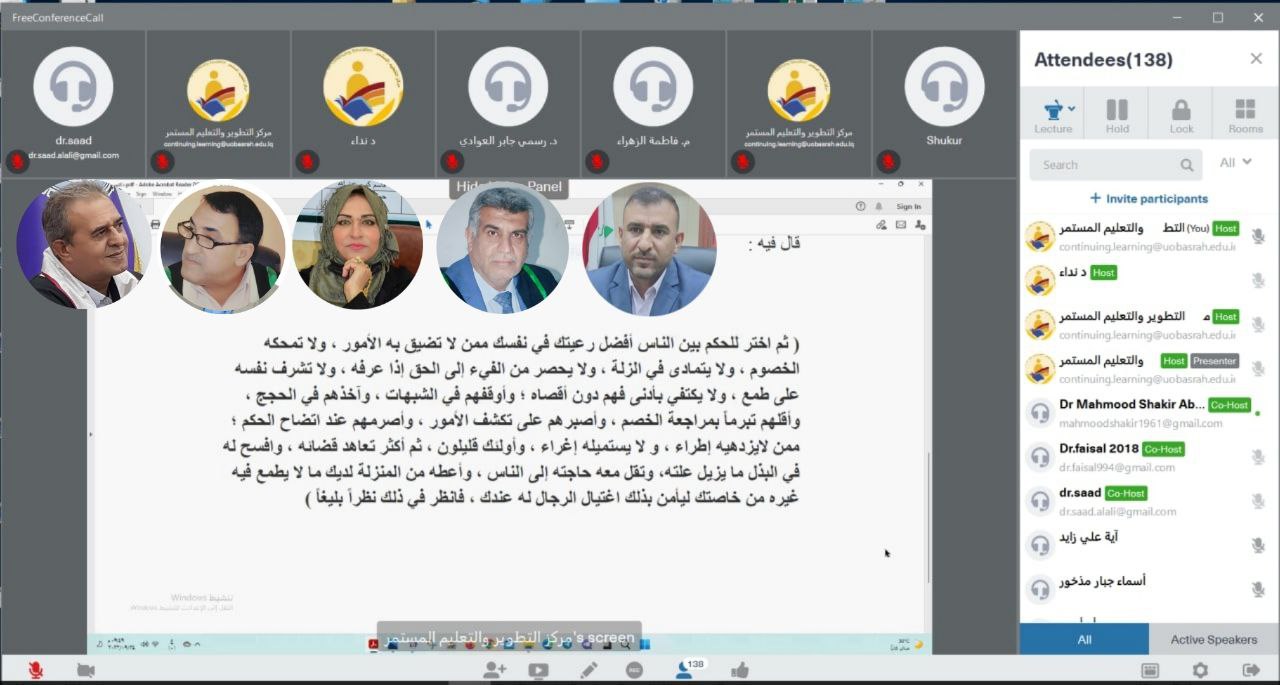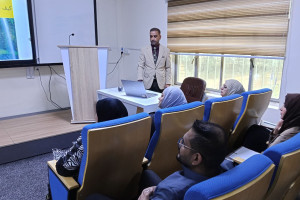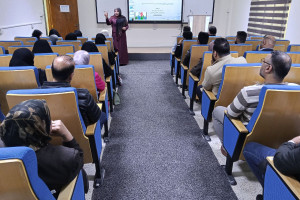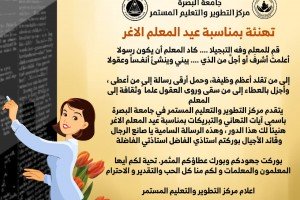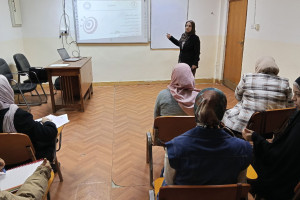
Development and Continuing Education at the University of Basra, an online symposium on leadership and governance (the message of Imam Ali, peace be upon him, to Malik Al-Ashtar as a model)
The aim of the symposium is to reveal the administrative leadership, its qualities and duties, based on the unique Islamic document of governance and just government, which is considered a constitution to organize life in its various directions, which is derived from a comprehensive strategic vision based on a deep understanding of the spirit of Islamic Sharia, which is the document of the era of Imam Ali, peace be upon him, to Malik Al-Ashtar. .
The seminar presented by a. Dr.. Saad Ali Zayer, University of Baghdad, Ibn Rushd College and a lecture on the generalization of social justice with diligence in the public satisfaction of the nation and Prof. Faisal Abdul Munshid, University of Basra, College of Education for Girls, Leader's Responsibility Lecture
so. Mahmoud Shaker Abdullah, University of Basra, Head of the Department of Educational and Psychological Sciences, a lecture on the conditions of a leader and a just ruler and a. Dr.. Nidaa Muhammad Baqir al-Yasiri, University of Basra, Department of Educational and Psychological Sciences, session moderation A lecture on clarification of the leader’s relationship with people and how people’s minds should focus on truth and their lives on justice, their relationship and their steps on the line of integrity and instilling the seeds of love in the souls of the parish, that is the responsibility that God Almighty carried him He exalted them in his leadership position and how he is fair to them from himself, his own, and those in whom there is a whim.. His commandment is about justice, tolerance, covering the nakedness, equality between the subjects and non-discrimination between them, as the saying of Imam Ali, peace be upon him, was revealed about the responsibility of the leader in releasing from people the knot of every grudge, i.e. the knot of rebellion. And cut off the cause of all enmity. He does not make the revolts rooted in the soul, accepting excuses, staving off limits with suspicions, and neglecting as much as possible about everything that is not clear, and that the ruler has only what appeared and advised him not to believe the messenger. As the Imam’s statement about people has been clarified, there are two types, either your brother in religion or your equal in creation. Missteps are neglected from them, and their ills are exposed to them, and they come at their hands in intentional and error. They also emphasized that the ruler should have a wide knowledge and understanding of the components of society. Not all people have the same thinking and the same capabilities, and that his behavior should be wise in light of their differences. The Imam’s statement about combating ignorance and illiteracy and bringing him closer to the people of knowledge, their care and honor were also explained. It was also addressed to the imam's directive to distance himself from the entourage, and that the discontent of the private is forgiven with the approval of the public. The imam’s commandment was emphasized to refrain from treachery in the subjects, and that treachery does not mean a bag, even if it is his opponents or opponents (and does not betray the one who knows how the reference) that is, does not betray the one who knows the trust, the subjects and his responsibility actually, as the imam says (If it were not for the hatred of treachery, I would have been one of the most evil of people) The administrative leader must be one of the best subjects and his qualities have been clarified.
In the end, the recommendation was that the entire Muslim community should be informed of this integrated message stemming from the Islamic Sharia, so that the community learns the foundations of dealing, tolerance, justice, love, loyalty, bloodshed, altruism, justice and brotherhood.
And all the administrators, leaders and those wishing to rule see the era of Imam Ali, peace be upon him, to Malik Al-Ashtar to benefit from it in all aspects of administrative, political, economic and social life
